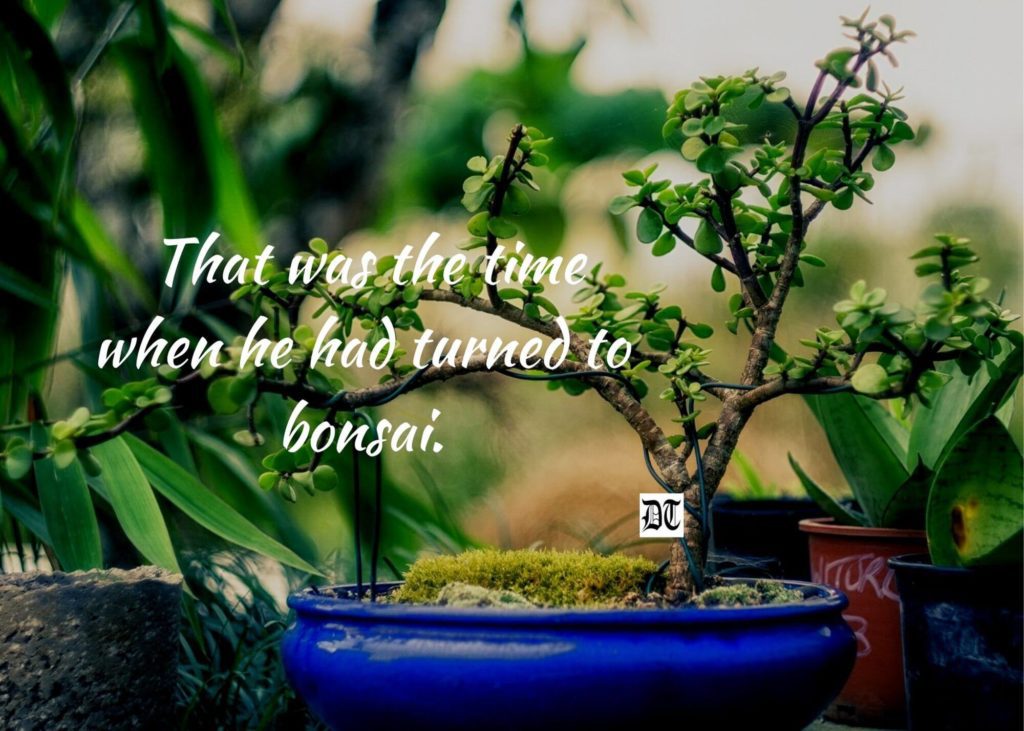Sujata tells us an intriguing story about Mahadev, Radha and their daughter, Pushpa. What was the missing link in the family? Will Mahadev ever know what had snapped? An exclusive for Different Truths.

Mahadev’s garden was the talk of the town. He didn’t own acres of land. Nor did he own anything like a riverfront villa to plan and experiment landscaping or cascading. A man of moderate means, not brilliant, not even ambitious, he accepted whatever job came his way, as an accountant in one of the local medical firms. His wife Radha brought with her a modest dowry.
A down to earth man, he invested it in a cottage left behind by a family, which had migrated to the U.S. People laughed at him for buying a house in such a dilapidated state. But he was confident he could transform the ruined cottage into a beauty, which he did in no time. He did not go looking for architects. Pulled down windows and doors, changed the entrance, plastered and painted the walls. And planned a neat little garden in the front yard.
The garden, a semicircle in shape, set the house idyllically in a leafy frame.
The garden, a semicircle in shape, set the house idyllically in a leafy frame. Mahadev had worked a miracle on the house. The house now looked like a cute cottage in a picture postcard.
The wicket gate, which had an arc-shaped arbour of creamy cherry blossoms, opened to a narrow pathway, fringed on either side by ferns. The path led to a flight of stone steps, straight to the main entrance. Mahadev did not believe in naming his house by a number as the City Corporation decreed. He chose a name for it. Aishwarya. Yes, that was what he would call his home. Prosperity for himself, his wife, and his little daughter. In golden letters he inscribed the name Aishwarya on the right side, above the panelled door.
The layout of Mahadev’s garden could have been the envy of any horticulturist.
The layout of Mahadev’s garden could have been the envy of any horticulturist. With great care and precision, he fenced the garden with hardy and thorny shrubs, sporting flowers, which gave out a strong pungent smell. It helped to keep cattle away. He chose flowers and foliage, perennials and annuals of various shapes and colours. He mixed and matched, blended and contrasted and the result was a riot of colours and a range of intriguing shapes. As seeds sprouted into shoots, spread into stems to branch off, budding and blooming, Mahadev stood watching as though mesmerised.
Radha, his wife, was slender, small-made and her ‘startled deer’ eyes, which made her look so lost and lovable, were hauntingly beautiful. Of course, Mahadev doted on her. But she dressed so sloppily. As for the art of housekeeping she knew nothing at all. Mahadev was quite shocked. He couldn’t blame her though. After all she was a farmer’s daughter. Sure, she felt uprooted in the big city and Mahadev’s urbaneness must have been un-nerving.
He happily set about arranging the wardrobe of his wife.
Mahadev knew he must at once take charge of the situation. He happily set about arranging the wardrobe of his wife. He made sure, he picked the right colours and the right design —pastel shades and small flowery prints. And Radha soon emerged as a worthy match to her husband. After all, wasn’t Mahadev an immaculately dressed man? The creases of his trousers were always intact. He wore shirts, only white, which were spotlessly clean, his tie was perfectly knotted, and his black leather shoes were polished to shine.
Radha had no great talent to boast of. But she had a sweet voice, and she could copy the catchy tunes of the popular movies almost effortlessly. But Mahadev had his own views about music, “There is nothing great about vocal music”, he often told her. “Why don’t you try to master an instrument? Give voice to a violin or a veena. You will know how much talent you have, how much power you have.”
Mahadev’s wisdom always inspired her. She did get herself a veena.
Mahadev’s wisdom always inspired her. She did get herself a veena. Turning the knobs on its sides, she tried to tighten and loosen the strings, moved her fingers up and down with devotion. But as luck would have it the veena refused to respond to her. That was how her foray into the world of music had come to a full stop.
When the little girl arrived, Radha was only too happy to leave her in the safe hands of her husband. Mahadev took all decisions and masterfully managed all crises. She cooked and cleaned, washed, and bathed Pushpa and dressed her always in white muslin frocks, as her husband had wished. With the precision of a wound clock, she measured her days over the errands, she ran for the family.
Radha would have loved to cuddle and croon over her little daughter.
Radha would have loved to cuddle and croon over her little daughter. But she knew it wouldn’t be proper. Mahadev wouldn’t have approved. After all, he had high hopes for his daughter. He wanted her to flower into a fine lady. No parent was as enthusiastic as Mahadev; at least that was what Pushpa’s teachers thought. He supervised her schoolwork, helped her with all her assignments.
There was no question of Radha coping with all that. Numbers puzzled her – she kept a neat record of accounts at home though! History and geography, she had left far behind. In any case, she was awfully busy. When she was not cooking she was stitching, when she was not stitching she was cleaning.
But father was always there for Pushpa. Mahadev taught her how to play badminton and chess.
But father was always there for Pushpa. Mahadev taught her how to play badminton and chess. He sent her across to the old Anglo-Indian lady who lived all by herself in the corner house to learn ‘piano and painting’. It was Mahadev again who told her to graduate in Home Science. Pushpa had always wished to be a doctor. She was disappointed. It was one of the rare occasions when she had tried to talk to her mother. Pushpa distinctly remembered what her mother had said, “Father knows best”.
Years ago, when she sketched a garden spider in her drawing book, she remembered, father was visibly disturbed. He had asked Pushpa to sit in the garden and draw whatever she liked best. Of course, father had expected her to turn up with the reproduction of a rose or a sunflower. But the eight gnarled legs of the spider and its silvery web mystified Pushpa and she copied them on the paper.
“A delicate girl like you, how could you choose a spider?” Father had been astonished.
“What is so delicate about being a girl? What is wrong in sketching a spider?” She had turned to her mother. Mother had said, quietly, “Father knows best”.
When Radha grew weak and pale Mahadev was quite concerned.
When Radha grew weak and pale Mahadev was quite concerned. The family doctor ruled out any major illness. She needed nutritious food, rest, fresh air, and some tonics. That was what he had recommended. But strange, Radha grew only weaker and paler. Her movements were not any longer lithe and graceful. With stooping shoulders and down cast eyes she moved around the house trying to cope with the chores – the doctor couldn’t explain why her skin reacted so strongly to the rays of the sun. If she ventured out even for a short while her skin would weep and erupt into small angry – red pimples.
Gradually she stopped moving out of the house. Shielding herself from the glare of the sun, in rooms darkened by thick curtains, bent over her prayer books she spent her last days. Her death, the doctor said her was due to heart failure. Strange. Neither Mahadev nor Pushpa ever suspected she had a weak heart.
When Mahadev pulled out one of the photographs of Radha from the family album … Pushpa took the responsibility of getting it framed.
When Mahadev pulled out one of the photographs of Radha from the family album — Radha in her bridal finery — Pushpa took the responsibility of getting it framed. It was a black and white photograph. Pushpa insisted on getting it enlarged and coloured whatever the charges might be. The photographer had put all his technical skill – mounting, laminating, and all sorts of special effects into the portrait. And there she was, so ethereal like an angel. A guardian angel-perched on the wall, keeping a fond watch over the family.
The day mother died was painfully alive in Pushpa’s mind. It was a winter afternoon. A Sunday. She was in the study room grappling with an equation in algebra. A fresh fruity flavour came wafting in. A date cake! Pushpa’s favourite. But mother was so sick she shouldn’t have been anywhere near the kitchen. Pushpa ran out of the room. Radha had just taken the cake out of the oven. On the kitchen floor soaked in sweat she had soon collapsed. Pushpa had no appetite for food for days. But she guarded the date cake furiously for one full week refusing to share it with anyone.
Retirement didn’t bother Mahadev.
Retirement didn’t bother Mahadev. Friends had their own fears. Radha gone, Pushpa grew up – busy as she was with her studies – home couldn’t have had much charm for him. But it was heartening to see Mahadev back in the garden with renewed vigour. Weeding out flowerbeds, mowing the lawn, repairing the fence he spent his days blissfully!
That was the time when he had turned to bonsai. To begin with, it looked like a passing fancy. Soon it became a passion with him. In no time he mastered the art and science of bonsai. Methodically like a scientist, he measured the soil sieved, and dried it, planted seedlings strategically in the containers, in the middle, to the right or to the left according to the shapes he had envisaged and planned for them. He bought for himself a brand-new pruning kit.

It was a treat to watch him at work. With great care he cut the root ends.
It was a treat to watch him at work. With great care he cut the root ends. Delicately, neatly he pinched and pruned the stems. With skilled fingers and right tools, he gave the trunks an intriguing twist, a shapely slant. If the branches took off on their own, in an attempt to rise and spread, he arrested them, promptly and expertly with a wire or a twine. Mahadev managed to dwarf even fruit trees. Orange, apple, and lemon. The miniatures stood on attractive stands or on raised platforms as the crowning glory of his garden.
If only Pushpa would lend him a hand in the garden! In the weeding, watering, or at least cleaning. But he was surprised, even hurt, she had never offered him any help. Across the dinner table only the other night, Mahadev had tried his best to draw her out.
“Pushpa, have you seen my latest bonsai? This time I want to experiment with pomegranates. The branches are already shaping.”
Pushpa stared at him for a moment in a strange way…
Pushpa stared at him for a moment in a strange way and had moodily gone back to her aloo bhaji and bhath.
Why was she being so difficult and aloof? Perhaps she was a bit tense, preoccupied. Naturally with examinations round the corner. But his daughter wasn’t quite herself, Mahadev was sure. Something was weighing on her mind. She was so silent! She had never been a chatterbox. But now she hardly talked.
Why had she become so unpredictable? Last week when she returned from her college picnic she had almost made a scene. All because Mahadev had chaperoned her to the picnic spot and back home. Once she joined her friends, he had left for the public library, nearby. Sure, in the evening he had gone back to fetch her home. Imagine, Pushpa bursting into tears and accusing him that he had humiliated her!
Today when Pushpa said she was going to attend the wedding of one of her close friends, he didn’t insist on accompanying her.
Today when Pushpa said she was going to attend the wedding of one of her close friends, he didn’t insist on accompanying her. But the house was only a few streets away. It was already evening. Pushpa should be home any moment.
Mahadev moved to the garden. The orange tree, he remembered, needed some trimming. Oh God! What had happened to the pomegranate buds? A brilliant red, anxious to bloom, there were five of them. He remembered; he had counted in the morning! Where were they? The rectangular tray in which stood the orange tree had a crack right in the middle. What a calamity!
One of the prized branches of the pine tree had snapped.
One of the prized branches of the pine tree had snapped. The missing limb lay a few yards away. Mahadev ran to the fence. Was there any gap in the fence? The Dalmatian next door? Had he got out of leash and crashed into his garden? He looked around in alarm. The lemon tree — only the stump remained! All the branches were cut off. Yes, they had been neatly cut off… No Dalmatian could have done that…
The wicket gate clicked open. It was Meenu, Pushpa’s friend. In her usual busy way, she breezed in. Behind her the dainty gate swung to and fro on its delicate hinges. She had not bothered to close it, Mahadev noticed with a frown. Careless and clumsy! How could Pushpa be so friendly with her? But where was Pushpa?
“I left Pushpa at the railway station…”
“I left Pushpa at the railway station. She is taking the Frontier Mail to Bombay.”
“Bombay?”
“Come on, Uncle! Don’t tell me you didn’t know; she had got a teaching job in Bombay. Lucky, it is a residential school. Don’t worry. She will be fine. Here, she has left a note for you and the keys”
That was the duplicate set of house keys which Pushpa used to keep with herself. Mahadev stared at it blankly. In a piece of crumpled paper, she had scribbled, “I am going away.”
Such a terse outburst, no before or after!
Going away? Why?
Going away? Why?
She never said she had any such plans!
She had not given him even the smallest hint!
Has she really gone to Bombay? Where could she have gone?
No goodbye, no au revoir?
His heart raced. He tried to swallow the lump that swelled in his throat.
His heart raced. He tried to swallow the lump that swelled in his throat. But it hurt. Awfully.
He walked slowly towards the splintered base of the dwarfed pine. He must file it. At once. But the garden spun around him. He sat down heavily on the hard earth and reached for the pruning kit. Clippers and scissors, trowels, and shears, one after the other, tumbled out of the kit. With a shaking hand, he rummaged listlessly for the right tool. His gold-rimmed spectacles sat tilted on the bridge of his aquiline nose. The cool evening breeze fanned the leaves and shook the ripening oranges.
Visuals by Different Truths





 By
By
 By
By
 By
By
 By
By
Excellent work..
Beautiful story. With a tinge of sadness I watched Pushpa escape the Bonsai life.
Enthralling story.beautiful descriptions subtle development of characters. Surprise ending reminded me of Saki Katherine Mansfield
Enthralling story. Beautiful descriptions. Subtle characterisation
Such a beautiful , thought provoking story. Interesting to the very end.
A very beautiful story with a poignant end. I could relate well to Mahadev’s character
Very beautiful, simple but powerful story indeed. Sujata has a unique ability to paint word pictures of the characters, landscape, and abstract concepts. I could visualize the garden and smell flowers. The detailed description of the garden shows Sujata’s deep knowledge of plants and flowers. The end of the story in my view justifies the title. I loved and enjoyed the story. Thanks for sharing Sujata. Best wishes always.
Sujata Sankranti’s story “Madahev’s Garden” is a brilliant allegory. On the surface this story shows us Madahev’s character, his controlling nature and his pride in ‘knowing what’s best”. As the story progresses and Madahev’s garden grows, we see the consequences of his insistence in being in control of every situation.
Madahev’s character is skilfully reinforced by the symbolism of his tending to and training his Garden to grow in his preferred style. Similarly through practice and instruction, Madahev trains his wife and daughter to attain particular skills or types of behaviour. As Madahev’s garden blooms under his care in its strictly regulated form, inexplicably his wife Radha begins to wilt and atrophy. Her mystery illness forces her into seclusion.
Madahev turns to Bonsai as the ultimate form of control of a plant: “Soon it became a passion with him. In no time he had mastered the art and science of bonsai. … With great care he cut the root ends, he gave the trunks and intriguing twist, as shapely slant. If the branches took off on their own, in an attempt to rise and spread, he arrested them, promptly and expertly with a wire or twine.” A perfect metaphor for this controlling character. Without stating it overtly, the author skilfully shows how his daughter Pushpa has recognised this and has herself become “a branch which has taken off on its own to rise and spread” despite Madahev’s best efforts and without his knowledge.
The final paragraph sums up the effect of his sudden loss of control brilliantly.
Sujata’s short stories are a masterclass in how to write fiction.